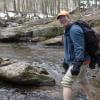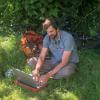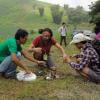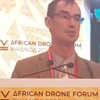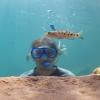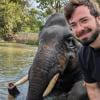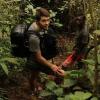With new technologies revolutionizing data collection, wildlife researchers are becoming increasingly able to collect data at much higher volumes than ever before. Now we are facing the challenges of putting this information to use, bringing the science of big data into the conservation arena. With the help of machine learning tools, this area holds immense potential for conservation practices. The applications range from online trafficking alerts to species-specific early warning systems to efficient movement and biodiversity monitoring and beyond.
However, the process of building effective machine learning tools depends upon large amounts of standardized training data, and conservationists currently lack an established system for standardization. How to best develop such a system and incentivize data sharing are questions at the forefront of this work. There are currently multiple AI-based conservation initiatives, including Wildlife Insights and WildBook, that are pioneering applications on this front.
This group is the perfect place to ask all your AI-related questions, no matter your skill level or previous familiarity! You'll find resources, meet other members with similar questions and experts who can answer them, and engage in exciting collaborative opportunities together.
Just getting started with AI in conservation? Check out our introduction tutorial, How Do I Train My First Machine Learning Model? with Daniel Situnayake, and our Virtual Meetup on Big Data. If you're coming from the more technical side of AI/ML, Sara Beery runs an AI for Conservation slack channel that might be of interest. Message her for an invite.
Header Image: Dr Claire Burke / @CBurkeSci

Explore the Basics: AI
Understanding the possibilities for incorporating new technology into your work can feel overwhelming. With so many tools available, so many resources to keep up with, and so many innovative projects happening around the world and in our community, it's easy to lose sight of how and why these new technologies matter, and how they can be practically applied to your projects.
Machine learning has huge potential in conservation tech, and its applications are growing every day! But the tradeoff of that potential is a big learning curve - or so it seems to those starting out with this powerful tool!
To help you explore the potential of AI (and prepare for some of our upcoming AI-themed events!), we've compiled simple, key resources, conversations, and videos to highlight the possibilities:
Three Resources for Beginners:
- Everything I know about Machine Learning and Camera Traps, Dan Morris | Resource library, camera traps, machine learning
- Using Computer Vision to Protect Endangered Species, Kasim Rafiq | Machine learning, data analysis, big cats
- Resource: WildID | WildID
Three Forum Threads for Beginners:
- I made an open-source tool to help you sort camera trap images | Petar Gyurov, Camera Traps
- Batch / Automated Cloud Processing | Chris Nicolas, Acoustic Monitoring
- Looking for help with camera trapping for Jaguars: Software for species ID and database building | Carmina Gutierrez, AI for Conservation
Three Tutorials for Beginners:
- How do I get started using machine learning for my camera traps? | Sara Beery, Tech Tutors
- How do I train my first machine learning model? | Daniel Situnayake, Tech Tutors
- Big Data in Conservation | Dave Thau, Dan Morris, Sarah Davidson, Virtual Meetups
Want to know more about AI, or have your specific machine learning questions answered by experts in the WILDLABS community? Make sure you join the conversation in our AI for Conservation group!
No showcases have been added to this group yet.
- @aardrop
- | he/him
Naturalist and technologist working to support the people behind nature
- 0 Resources
- 4 Discussions
- 2 Groups
- 0 Resources
- 0 Discussions
- 6 Groups
- @lobrien
- | he/him
Low K-Shot Animal Reidentification pipelines
- 0 Resources
- 6 Discussions
- 5 Groups
International Union for the Conservation of Nature (IUCN)
Key Biodiversity Areas Programme Officer, IUCN
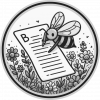


- 0 Resources
- 89 Discussions
- 8 Groups
- 0 Resources
- 0 Discussions
- 1 Groups
British Antarctic Survey
Machine learning researcher at the British Antarctic Survey
- 0 Resources
- 0 Discussions
- 5 Groups
- 0 Resources
- 1 Discussions
- 9 Groups
working on the digital transformation for environment, climate, and conservation
- 0 Resources
- 5 Discussions
- 2 Groups
- @raquelgo
- | (she/her/hers)
- 0 Resources
- 0 Discussions
- 17 Groups
Software Engineer


- 0 Resources
- 5 Discussions
- 10 Groups
- @Jaeyoung
- | He
I am a member of the Design for Social Innovation and Sustainability Lab (DESIS Lab) at Yonsei University, where I am pursuing a master's degree in Human Environment and Design. My study is about sustainable HCI, children's connection to nature, and product-service design.
- 0 Resources
- 0 Discussions
- 4 Groups
American Museum of Natural History
- 1 Resources
- 8 Discussions
- 10 Groups
Climate Change AI calls for applications for Innovation Grants regarding AI/ML research projects. Eligible applicants are principal investigators at accredited universities in OECD member countries.
12 August 2024
In this post, I describe an animal recognition demonstration app I developed for the iPhone. The “MegaDetector-Demo” app uses the latest “MegaDetector” animal detector model from PyTorch-Wildlife to identify animals,...
11 August 2024
To celebrate our 9th Annual #Tech4Wildlife Photo Challenge happening this week, we’re taking a look at past and current submissions that feature the fastest growing areas of conservation tech: movement ecology, AI,...
7 August 2024
We are thrilled to introduce our new horizon scan, which will chart the future of bioacoustics. By collectively prioritizing emerging innovations that could transform the field, we aim to build consensus, facilitate...
5 August 2024
Hi all, I've published a blog post on rapidly labeling camera trap data using ChatGPT for species identification and a simple object detection model to get the bounding boxes. While presented in Edge Impulse, this...
17 July 2024
We are recruiting an (extendable) 2-year postdoc in my group to develop new technologies (cameras, microphones, deep learning, etc) to track earthworm activity in the field.
16 July 2024
The Reversing Environmental Degradation in Africa and Asia (REDAA) Programme is seeking a consultant to look into current issues with AI to develop a better shared understanding of how AI and related technologies could...
11 July 2024
Aerial seeding with drones has great potential in forest restoration but faces enormous challenges to be efficient and scalable. Current protocols use blanket seeding throughout the area to be restored, meaning a high...
20 June 2024
Come join us at AIMS, and work on deep learning for bioacoustics research!
14 June 2024
The AI for Climate and Nature Grand Challenge initiative from the Bezos Earth Fund has opened a call for proposals for "exploring new ideas for multiplying the impact of climate and nature efforts using modern AI"
12 June 2024
The San Diego Zoo Wildlife Alliance's Burrowing Owl Recovery Program and Conservation Technology Lab seek a postdoctoral research associate to develop bioacoustic tools for monitoring the western burrowing owl...
11 June 2024
August 2025
event
September 2025
event
event
event
event
October 2025
event
event
event
December 2025
event
March 2026
July 2022
event
event
June 2022
event
event
17 Products
Recently updated products
| Description | Activity | Replies | Groups | Updated |
|---|---|---|---|---|
| Hi Phani,An entry point might be to participate in a challenge related to conservation on:KaggleDrivenDataFruitPunchMax Planck Institute of Animal BehaviorYou could also reach out... |
|
AI for Conservation | 1 year 3 months ago | |
| [oops, the same reply got submitted twice and there doesn't seem to be a "delete" button] |
|
AI for Conservation, Camera Traps | 1 year 3 months ago | |
| Hi @zhongqimiao ,Might you have faced such an issue while using mega detectorThe conflict is caused by:pytorchwildlife 1.0.2.13 depends on torch==1.10.1pytorchwildlife 1.0.2.12... |
+6
|
AI for Conservation, Camera Traps, Open Source Solutions | 1 year 3 months ago | |
| Hi, this is pretty interesting to me. I plan to fly a drone over wild areas and look for invasive species incursions. So feral hogs are especially bad, but in the Everglades there... |
|
AI for Conservation, Camera Traps, Open Source Solutions, Software Development | 1 year 3 months ago | |
| Gotcha, well I look forward to seeing future iterations and following along with your progress!! |
|
Autonomous Camera Traps for Insects, AI for Conservation, Emerging Tech, Open Source Solutions, Latin America Community | 1 year 3 months ago | |
| Hi everyone!@LashaO and @holmbergius from the Wild Me team at ConservationX Labs gave a superb talk at last month's Variety Hour,... |
|
AI for Conservation, Camera Traps | 1 year 4 months ago | |
| We could always use more contributors in open source projects. In most open source companies Red Hat, Anaconda, Red Hat and Mozilla, people often ended up getting hired largely... |
|
Acoustics, AI for Conservation, Conservation Tech Training and Education, Early Career, Marine Conservation | 1 year 4 months ago | |
| Hi @timbirdweather I've now got them up and running and winding how I can provide feedback on species ID to improve the accuracy over time. It would be really powerful to have a... |
|
Acoustics, AI for Conservation, Citizen Science, Emerging Tech | 1 year 5 months ago | |
| Really interesting project. Interesting chip set you found. With up to around 2mb sram that’s quite a high memory for a ultra low power soc I think.It might also be... |
+8
|
Acoustics, AI for Conservation | 1 year 5 months ago | |
| Thank you so much for your encouraging words! I'm thrilled to hear that you enjoyed our conversation, and I truly appreciate your support in spreading the word about my survey... |
|
Acoustics, AI for Conservation | 1 year 5 months ago | |
| Perfect thanks! I am still a novice using Python but my wife can help me! |
+6
|
AI for Conservation, Camera Traps, Human-Wildlife Coexistence | 1 year 6 months ago | |
| Hi everyone! My name is Leah Govia and I am a PhD candidate at the University of Guelph, Canada. My research explores what people... |
|
Ethics of Conservation Tech, Conservation Tech Training and Education, AI for Conservation | 1 year 6 months ago |









